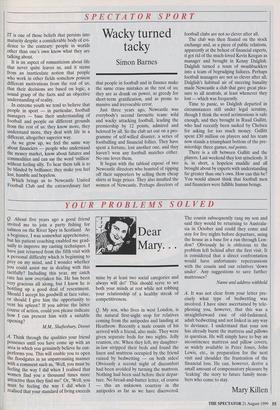SPECTATOR SPORT
Wacky turned tacky
Simon Barnes
IT is one of those beliefs that persists into maturity despite a considerable body of evi- dence to the contrary: people in worlds other than one's own know what they are talking about.
It is an aspect of romanticism about life that never quite leaves us, and it stems from an inarticulate notion that people who work in other fields somehow possess different motivations from the rest of us; that their decisions are based on logic, a sound grasp of the facts and an objective understanding of reality.
In extreme youth we tend to believe that people in sport — in particular, football managers — base their understanding of football and people on different grounds from the rest of us: they know more, they understand more, they deal with life in a different, altogether superior way.
As we grow up, we feel the same way about financiers — people who understand the money market, know about futures and commodities and can say the word 'million' Without feeling silly. To bear them talk is to be blinded by brilliance; they make you feel lost, humble and hopeless. Which brings us to Newcastle United Football Club and the extraordinary fact that people in football and in finance make the same crass mistakes as the rest of us; they are as drunk on power, as greedy for short-term gratification, and as prone to massive and irrevocable error.
Just three years ago, Newcastle was everybody's second favourite team: wild and wacky attacking football, leading the premiership by 12 points, admired and beloved by all. So the club set out on a pro- gramme of self-willed disaster, a series of footballing and financial follies. They have spent a fortune, lost another one, and they haven't won any football matches either. No one loves them.
It began with the tabloid exposé of two Newcastle directors who boasted of ripping off their supporters by selling them cheap shirts at huge prices. They also insulted the women of Newcastle. Perhaps directors of football clubs are not so clever after all.
The club was then floated on the stock exchange and, as a piece of public relations, apparently at the behest of financial experts, it got rid of the much-loved Kevin Keegan as manager and brought in Kenny Dalglish. Dalglish turned a team of swashbucklers into a team of begrudging failures. Perhaps football managers are not so clever after all. Dalglish's habitual air of sneering banality made Newcastle a club that gave great plea- sure to all neutrals, at least whenever they lost — which was frequently.
Time to panic, so Dalglish departed in circumstances still under legal scrutiny, though I think the word acrimonious is safe enough, and they brought in Ruud Gullitt, who had recently been sacked by Chelsea for asking for too much money. Gullitt spent £30 million on players and his team now stands a triumphant bottom of the pre- miership: three games, nul points.
There is a rift between Gullitt and the players. Last weekend they lost spinelessly. It is, in short, a hopeless muddle and all brought about by experts with understanding far greater than one's own. How can this be? You would almost think that football men and financiers were fallible human beings.


























































 Previous page
Previous page